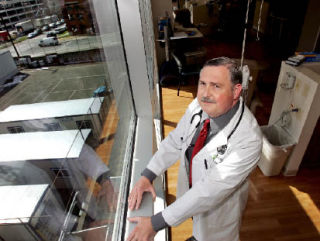Dr. Paul Knoll set out to be a physicist. After three years at the University of Washington, he felt a strong tug in another direction.
“I wanted to use human skills rather than physics and math,” Knoll said, who grew up on the Island and is a Mercer Island High School graduate.
At 57, the oncologist has spent his career emulating role models from his UW medical school years. With great skill and knowledge, those doctors demonstrated emotion and empathy.
A scientist compelled to serve humanity, Knoll followed their lead. He has practiced in Everett since 1981, first on his own and for years with the Western Washington Medical Group.
In Knoll’s small office at the new Providence Regional Cancer Partnership, artwork has been taken down from the walls. May 2 was his last day on the job.
He is too young to retire, but it is time to go. Knoll is losing his own battle with the disease he has spent his professional life fighting.
First diagnosed with colon cancer in 2002, the doctor has had the disease recur twice. He has had arduous surgeries and courses of chemotherapy. He is not being treated now, except for his excruciating pain.
“I don’t want to lose my edge as a physician,” Knoll said on Wednesday. “I am certainly going to miss the practice. I am grieving for it.”
He is anguished over leaving his patients.
“It’s hard to see them at this point. They are also losing me,” said Knoll, who has been helping patients in their transition to other care.
Knoll’s own doctor is his Western Washington Medical Group colleague, Dr. Mark Coughenour. Being a doctor-as-patient is a revelation, the former Islander said. He knows what it is like to be on the receiving end of treatment. And his cancer gives him a personal way to talk with frightened patients.
“It’s been extraordinary. I have much in common with everybody else,” he said. Depending on the patient, Knoll has sometimes shared that he has been through treatment. Pulling up his shirtsleeve to reveal a port under his skin used to administer medications, he said he would tell patients, “See? I’ve got one.”
His caring career is not going unrecognized.
On Thursday, he will have the community’s thanks when he receives the 2008 Physician of the Year Award from the Home Care Association of Washington. The award will be presented at a luncheon at the Holiday Inn in Everett.
For more than 25 years, Knoll has been involved with Providence Hospice and Home Care of Snohomish County. He has been a volunteer medical director in what started as a grassroots organization dedicated to helping patients die at home with as little pain as possible. Knoll devoted hours each week to reviewing hospice cases and writing medication orders, and even went to pharmacies when other doctors were not available.
Joni Copeland, director of business development for Providence Hospice, said Knoll is intensely dedicated to a dying patient’s right to comfort. “For his humanity, we wanted to lift him up at this time,” she said.
In a letter nominating him for the award, Providence Hospice staff wrote of Knoll’s cancer journey: “He now is intimately getting to know the personal and family struggles that his patients and our hospice patients are facing.”
After the 2002 surgery and chemotherapy that followed his first diagnosis, Knoll thought he was free of cancer.
“It was quite a shock,” he said when the disease was found in 2006 in a lymph node in his neck. Many treatments have followed, but the cancer is now in his spine and nearby tissue. While still exploring options, including Swedish Medical Center’s Seattle CyberKnife Center, he knows that he may buy time, but he won’t get a cure.
His case is not typical of colon cancer, which often spreads to the liver and lungs. Through the years, he has seen improved cure rates.
“I’m just not one of them. I look much better than I feel,” Knoll said, explaining that stopping chemotherapy allowed his hair to grow back.
He has done little lately but work, come home exhausted and sleep. Knoll looks forward to spending time at home in Mukilteo with his wife, Mary, an Everett Symphony violinist. They have a 28-year-old daughter who lives on Mercer Island and is studying political science at the UW, and a son, 23, attending the University of California, Los Angeles, in music performance. His mother Anne Knoll lives on the Island.
A devotee of classical music, Knoll has an iPod loaded with favorites. He is also well enough to walk his 15-year-old sheltie, Tasha.
He has two pieces of advice: one medical, and the other general.
“I might have picked it up earlier if I’d done a colonoscopy at 50,” he said. “Mortality is reduced a lot with early detection. It should be done at age 50 or earlier if you have a family history [of colon cancer].”
Enjoy life: That’s another lesson Knoll learned. “You get so involved in work and activity. I wish I’d had more time to relax and have fun, to lighten up and take it easy.”
Anne Hartline, a long-time Providence Everett Medical Center employee who has worked as a hospice educator, is 10 years into her breast cancer battle. When Knoll was undergoing chemotherapy, Hartline was also being treated. They sometimes sat together during treatments at the Everett cancer center.
“He’s a great guy,” said Hartline, 57, of Arlington. Patients form special bonds with oncologists. “It literally is a lifeline,” she said.
Knoll is giving patients a gift by letting them know of his struggle, Hartline said. Knoll stands in awe of some of those patients.
“It’s given me respect for how well they cope. It’s really just hard to get through,” Knoll said. “Some of those patients are tougher than I am.”
This story was reprinted with permission from The Everett Herald.Columnist Julie Muhlstein: (425) 339-3460, muhlstein@heraldnet.com.


